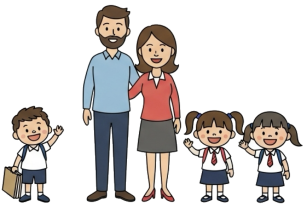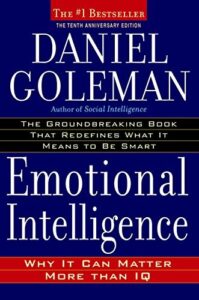
Question More, Action Knowledge.
Remember, at QMAK, we don’t just teach; we empower. We don’t just inform; we inspire. We don’t just question; we act. Become a Gold Member, and let’s unlock your child’s full potential, one question at a time.
 In our last article, we explored Daniel Goleman’s groundbreaking work on emotional intelligence and how cultivating self-awareness and self-control can help our homeschoolers thrive. Expanding on these ideas, Goleman also highlights the crucial role of empathy, hope, and relationship skills in creating a fulfilling and purposeful life.
In our last article, we explored Daniel Goleman’s groundbreaking work on emotional intelligence and how cultivating self-awareness and self-control can help our homeschoolers thrive. Expanding on these ideas, Goleman also highlights the crucial role of empathy, hope, and relationship skills in creating a fulfilling and purposeful life.
By nurturing these capacities alongside cognitive development, we equip our children to build nourishing connections, bounce back from adversity, and make a positive difference in the world.
One of Goleman’s key insights is that empathy – the ability to sense and understand others’ emotions – is the foundation of all effective relationships. He explains that empathy “builds on self-awareness; the more open we are to our own emotions, the more skilled we will be in reading feelings.”
We can help our children develop this vital capacity by modeling and encouraging perspective-taking, active listening, and compassionate communication. When conflicts arise, we can guide them to consider the other person’s experience and needs, fostering understanding and creative problem-solving. By learning to attune to and care about others’ feelings, they lay the groundwork for rich and rewarding relationships throughout life.
Closely tied to empathy is the ability to handle relationships smoothly – the social skills to navigate emotions and express our needs and concerns in ways that invite connection rather than defensiveness. Goleman emphasizes that mastering the “dance of relationship” is key to both personal and professional success.
We can support our children in developing these skills by coaching them to express themselves assertively and respectfully, listen deeply to others, and work collaboratively to find win-win solutions. Role-playing challenging social scenarios, debriefing interpersonal successes and stumbles, and encouraging them to take others’ perspectives all help to hone these critical abilities. By learning to initiate, deepen, and repair relationships, they’ll be well-equipped to form meaningful partnerships in all areas of life.
Another powerful capacity Goleman explores is hope – the combination of “believing you have both the will and the way to accomplish your goals, whatever they may be.” He cites research showing that hope is a stronger predictor of academic success than IQ, and a key factor in resilience in the face of challenge.
We can nurture our children’s sense of hope by helping them identify meaningful goals, break them down into manageable steps, and celebrate their efforts and progress along the way. When they face setbacks, we can emphasize their capacity for growth and creative problem-solving. By focusing on the process rather than fixed abilities, and affirming that their efforts make a difference, we empower them to keep striving for what matters most.
Goleman also highlights fascinating research on the power of optimism in shaping life outcomes. He explains that optimists tend to see setbacks as temporary, specific, and changeable, while pessimists see them as pervasive, permanent, and uncontrollable. As a result, optimists are more likely to persevere in the face of challenges and bounce back from disappointments.
We can cultivate an optimistic mindset in our kids by modeling positive self-talk, expressing confidence in their abilities, and framing obstacles as opportunities to learn and grow. By developing a habit of questioning negative assumptions and looking for alternative perspectives, they can build resilience and maintain motivation even when things get tough.
Finally, Goleman reminds us that cultivating emotional intelligence is a lifelong journey that requires ongoing reflection, practice, and commitment. He encourages us to approach developing EQ with the same discipline and dedication we would devote to mastering any complex skill.
We can model this growth mindset by sharing our own experiences and insights as we work to increase our self-awareness, empathy, and relationship skills. By being honest about our struggles and celebrating our progress together, we create a family culture of emotional literacy and continuous improvement. Regular check-ins, shared readings, and playful EQ-building activities weave this vital learning into the fabric of our homeschooling life.
By making the development of emotional intelligence a cornerstone of our homeschooling, we equip our children with the self-understanding, relational wisdom, and grounded optimism to create lives of connection, resilience, and positive impact. As Goleman writes, “The next step in human evolution is learning to use our emotions more intelligently to guide us through the complex world we inhabit – and in so doing expand the definition of what being smart really means.” Let us embrace this vision and empower a generation with the skills to build a brighter future for themselves and our world.
In conclusion, Daniel Goleman’s pioneering research on emotional intelligence offers invaluable insights for homeschooling families committed to our children’s holistic development. By understanding EQ as a set of learnable skills encompassing self-awareness, self-management, empathy, hope, optimism and relationship-building, we can integrate practices that nurture these capacities into the heart of our homeschooling.
As Goleman writes, “IQ and technical skills are important, but emotional intelligence is the sine qua non of leadership.” The same could be said of parenting and educating our kids. By embracing these ideas and practices, we give our children a tremendous foundation for creating lives of passion, purpose, and positive impact. And in the process, we can’t help but grow ourselves, enhancing our own EQ and experiencing the ripple effects throughout our families and communities.
It’s an investment well worth making.

Remember, at QMAK, we don’t just teach; we empower. We don’t just inform; we inspire. We don’t just question; we act. Become a Gold Member, and let’s unlock your child’s full potential, one question at a time.